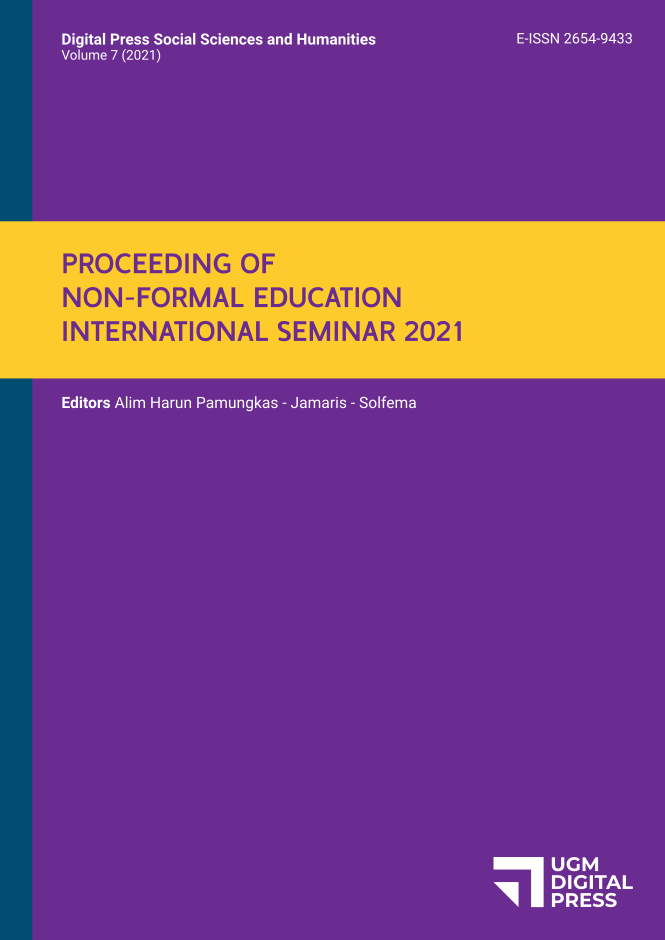Analysis of the Effectiveness of Waqf Volunteers’ Training (Case Study: Waqf Volunteers’ Training Based on Digital Fundraising at AQL Islamic Center)
Mursyida Nurfadhilla
, Jajat Sudrajat Ardiwinata
, Iip Saripah
Department of Community Education, Universitas Pendidikan Indonesia, Bandung, Indonesia
mursyida@upi.edu
Abstract
The training system is a process designed so that the training carried out can achieve the expected goals. Significant changes are certainly expected after the training process ends. However, the institution must be aware that the abilities possessed by each training participant are certainly different from one another. This research uses descriptive qualitative research with a case study approach, because to analyze the effectiveness of a process of training workers or volunteers in an institution or organization requires a detailed description so as not to cause an error in analyzing. The results of this study indicate that the training carried out by the AQL Islamic Center is less effective, the AQL Islamic Center does not apply the training evaluation method in accordance with the method of measuring the effectiveness of the training. The AQL Islamic Center only implemented an evaluation system in the form of an internal meeting called MONEV (Monitoring and Evaluation), but the MONEV internal meeting only discussed training events that had been held. the conclusion that the training organized by the AQL Islamic Center has been running smoothly and according to what has been planned but has not been effective based on the measurement of the effectiveness of the training.
Keywords
The purpose of training, Training effectivity, Evaluation of training
References
Ahmadi, R. (2016). Metodologi Penelitian Kualitatif. Malang: Ar-ruzz Media.
Charismi, A. A., Djudi, M., & Ruhana, I. (2016). Analisis Efektivitas Pelatihan (Studi Kasus Unit Pengembangan Karir Dan Kewirausahaan Universitas Brawijaya Malang). Jurnal Administrasi Bisnis (JAB, 38(2). Retrieved from https://media.neliti.com/media/publications/87365-ID-analisis-efektivitas-pelatihan-studi-pad.pdf
Mandang, E. F., Lumanauw, B., & Walangitan, M. D. B. (2017). Pengaruh Tingkat Pendidikan dan Pelatihan Terhadap Kinerja Karyawan Pada PT. Bank Rakyat Indonesia (Persero), Tbk Cabang Manado. Jurnal EMBA, 5(3). https://doi.org/10.35794/emba.v5i3.18427
Meitaningrum, D. A., Hardjanto, I., & Siswidiyanto. (2013). Efektivitas Pendidikan dan Pelatihan dalam Meningkatkan Kinerja Pegawai (Studi Pada Badan Kepegawaian Daerah Kabupaten Malang). Jurnal Administrasi Publik (JAP), 1(3). Retrieved from https://media.neliti.com/media/publications/74066-ID-efektivitas-pendidikan-dan-pelatihan-dal.pdf
Miles, M. ., & Huberman, A. . (1994). Qualitative Data Analysis. London: Sage Publishers.
Murtie, A. (2012). Menciptakan SDM Yang Handal Dengan Training, Motivation, Coaching. Jakarta: Laskar Aksara.
Wellem, I., Silva, Y. O. Da, & Doncellino, Y. C. (2020). Analisis Kinerja Karyawan Dengan Menggunakan Performance Analysis Quadrant (PAQ) pada Perusahaan Daerah Air Minum (PDAM) Kabupaten Sikka. Jurnal Projemen, 7(1).
mursyida@upi.edu
Abstract
The training system is a process designed so that the training carried out can achieve the expected goals. Significant changes are certainly expected after the training process ends. However, the institution must be aware that the abilities possessed by each training participant are certainly different from one another. This research uses descriptive qualitative research with a case study approach, because to analyze the effectiveness of a process of training workers or volunteers in an institution or organization requires a detailed description so as not to cause an error in analyzing. The results of this study indicate that the training carried out by the AQL Islamic Center is less effective, the AQL Islamic Center does not apply the training evaluation method in accordance with the method of measuring the effectiveness of the training. The AQL Islamic Center only implemented an evaluation system in the form of an internal meeting called MONEV (Monitoring and Evaluation), but the MONEV internal meeting only discussed training events that had been held. the conclusion that the training organized by the AQL Islamic Center has been running smoothly and according to what has been planned but has not been effective based on the measurement of the effectiveness of the training.Keywords
The purpose of training, Training effectivity, Evaluation of trainingReferences
Ahmadi, R. (2016). Metodologi Penelitian Kualitatif. Malang: Ar-ruzz Media.
Charismi, A. A., Djudi, M., & Ruhana, I. (2016). Analisis Efektivitas Pelatihan (Studi Kasus Unit Pengembangan Karir Dan Kewirausahaan Universitas Brawijaya Malang). Jurnal Administrasi Bisnis (JAB, 38(2). Retrieved from https://media.neliti.com/media/publications/87365-ID-analisis-efektivitas-pelatihan-studi-pad.pdf
Mandang, E. F., Lumanauw, B., & Walangitan, M. D. B. (2017). Pengaruh Tingkat Pendidikan dan Pelatihan Terhadap Kinerja Karyawan Pada PT. Bank Rakyat Indonesia (Persero), Tbk Cabang Manado. Jurnal EMBA, 5(3). https://doi.org/10.35794/emba.v5i3.18427
Meitaningrum, D. A., Hardjanto, I., & Siswidiyanto. (2013). Efektivitas Pendidikan dan Pelatihan dalam Meningkatkan Kinerja Pegawai (Studi Pada Badan Kepegawaian Daerah Kabupaten Malang). Jurnal Administrasi Publik (JAP), 1(3). Retrieved from https://media.neliti.com/media/publications/74066-ID-efektivitas-pendidikan-dan-pelatihan-dal.pdf
Miles, M. ., & Huberman, A. . (1994). Qualitative Data Analysis. London: Sage Publishers.
Murtie, A. (2012). Menciptakan SDM Yang Handal Dengan Training, Motivation, Coaching. Jakarta: Laskar Aksara.
Wellem, I., Silva, Y. O. Da, & Doncellino, Y. C. (2020). Analisis Kinerja Karyawan Dengan Menggunakan Performance Analysis Quadrant (PAQ) pada Perusahaan Daerah Air Minum (PDAM) Kabupaten Sikka. Jurnal Projemen, 7(1).

